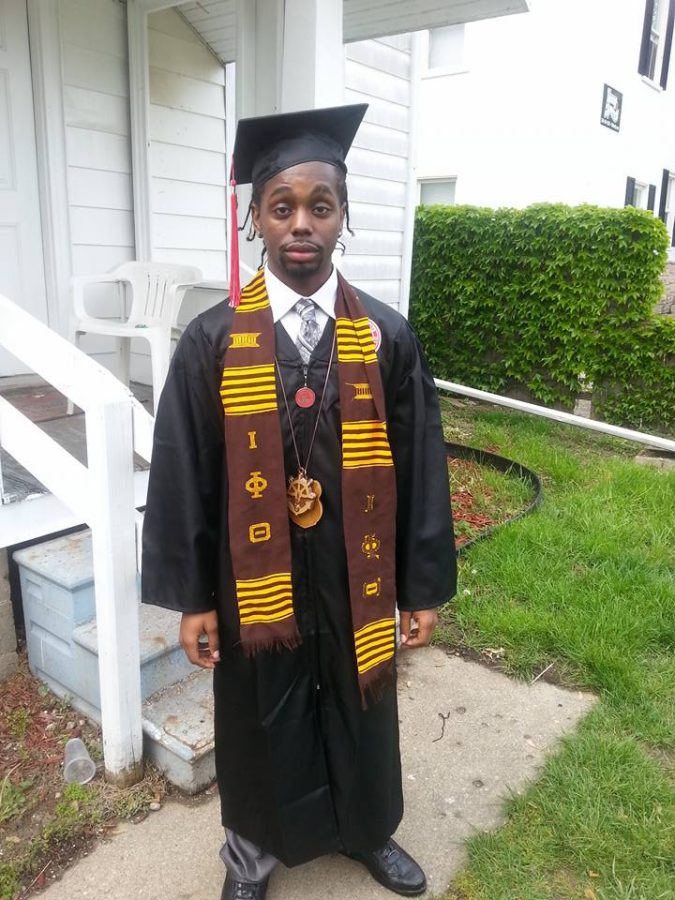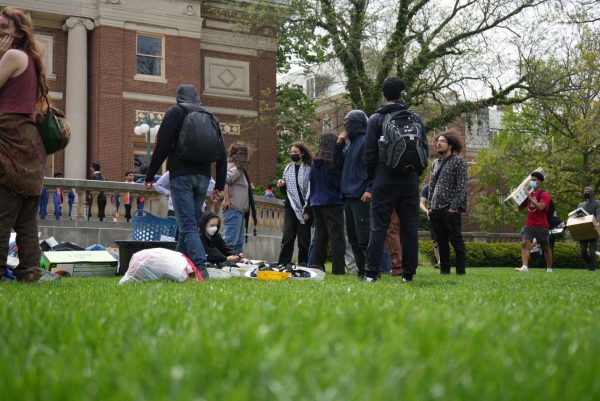Mother of Champaign shooting victim questions UI honorary degree requirements
Kristian “KP” Philpotts before his Illinois State University graduation.
July 16, 2022
Ever since Kristian “KP” Philpotts was little, he loved animals more than anything else. Taking care of them became his passion — a dream he desired to chase as he grew into adulthood.
“He had a passion for animals since he was seven or eight years old, and it never stopped or went away,” Marla Rice, Philpotts’ mother, said. “When the commercials would come on about the abused animals, he would get really upset and beg for me to change the channel.”
When it came time to pick a major, Philpotts chose pre-veterinarian science and studied at Illinois State University. Later, he would graduate from Eastern Illinois University with a master’s in pre-veterinarian science.
His next stop? A doctorate degree from the University of Illinois Urbana-Champaign’s College of Veterinary Sciences.
“His dream was to become a veterinarian, get that degree and then a doctorate from Illinois,” David Glassman, the president of EIU, said.
Get The Daily Illini in your inbox!
But Philpotts’ dream was cut short. On Jan. 12, he was murdered during an attempted robbery while he was driving for Lyft — becoming the first victim of a gun crime in Champaign-Urbana this year.
Now, Philpotts’ mother is trying to actualize her son’s dream through an honorary doctorate degree from the University, a process she says has not been simple.
Over a series of emails and phone calls beginning in February, the University told Rice that Philpotts was not eligible to receive an honorary degree because he was not officially admitted to the University.
“We confirmed that Kristian had not been accepted to the University of Illinois at Urbana-Champaign, but we are adding him to the list of students who will be honored with a Certificate of Achievement for his intention to complete a degree at Illinois,” Wendy Bertram, the executive assistant to the Chancellor, said in an email to Rice.
But Rice said that the requirements on the University Senate’s website do not specifically state that a nominee must be enrolled in the University.
According to the Senate’s website, “The (nomination) Committee will consider, but not be bound by, the degree to which the candidate has had some association with Illinois — the University or the State.”
“The honorary degree does not require you to be a student, so why would you even say that my son was never even accepted at your school?” Rice asked.
Aside from enrollment, there is a core requirement that nominees must meet.
In order to be nominated, a candidate must have made a “distinguished contribution to knowledge and creativity in the relevant field of endeavor, or have shown sustained activity of uncommon merit,” according to the Senate’s website. The contribution can be in scholarship, creative arts, professions, public service and business.
Rice said Philpotts met the contribution requirement through public service. One of the contributions he made was founding a program at EIU called “Kids for Science,” where he would bring animals from pet stores to schools and teach about them.
“He wanted to give kids access to a university education … and to provide for them a type of science program so that they could look at the different reptiles and other things and just try to get them excited,” Glassman said.
Philpotts also reopened the Iota Phi Theta chapter at EIU that had been closed for 27 years and helped recruits meet a grade requirement through tutoring and mentoring.
Glassman described another mentoring program that Philpotts started. In the program, Philpotts would help African American students succeed by providing information on resources and mentoring.
“He was somebody who wanted a better pathway for students of color and to help them change their lives, achieve their goals and reach their dreams,” Glassman said. “That’s the kind of person he was.”
Rice said that she filled out the official degree nomination, which included Philpotts’ service record, and sent it off to be processed. The next day, she received an email that said the request was denied.
“I am so sorry that we cannot help you with this request,” Robin Kaler, the associate chancellor for public affairs, said in the email to Rice. “Our honorary degree program isn’t structured to recognize people who never had the opportunity to fulfill their potential.”
Instead, Philpotts will be honored with a certificate that recognizes his intent to complete a degree at the University.
“Those who weren’t able to complete their education at Illinois are honored through a program that presents a certificate of recognition to the family of the deceased honoree,” Kaler said.
Rice does not think the certificate is enough.
“I know if he would have started at this school, he was going to finish,” Rice said. “He didn’t come this far not to finish. All I’m asking them on this is could they please honor him the way that he deserved to be honored?”
Rob Rhykerd, an ISU professor and close mentor of Philpotts, said that while he does not want to “step on the U of I’s toes,” he thinks that whether it be through a degree or certificate, “KP” should be honored in some way.
“He’s a worthy individual,” Rhykerd said. “He worked hard and tried to get jobs in the industry and was trying to do everything right — I would hate to see that go unrewarded.”
Glassman said that honorary degrees are difficult to obtain if the nominee did not attend the institution the request is for.
At EIU, a deceased student will receive an honorary certificate of participation, but if they were in their last semester of graduating, they will receive the degree.
“For the universities I’ve been affiliated with, honorary degrees haven’t been given to students,” Glassman said. “It’s been alumnus and individuals that have a major affiliation with the institution.”
At the University, most honorary degree recipients are not students, but educators.
Upon requests to comment on the nominating procedure and Philpotts’ situation, the University Senate did not respond to The Daily Illini.
Although the official request has been denied, Rice said she is not giving up. She has started a petition to try to garner support for Philpotts’ dream of earning his doctorate degree.
“This was his dream, and that’s why I’m fighting so hard because this was his dream,” Rice said. “This is something he wanted to do.”







